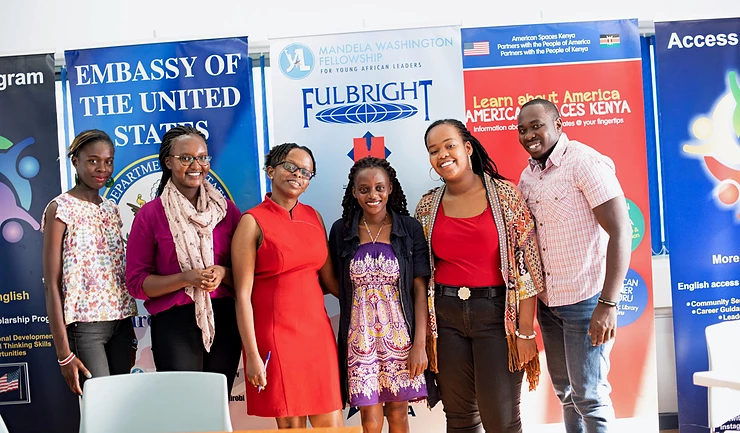At the start of the year 2020, as Ryculture Health and Social Innovation, basing on lessons learnt in the past two years in line with our health advocacy work established the Ryculture YouTH Voices Program. This was to provide a platform to amplify the voices of young people creating waves of positive change in the different tracks for health in Kenya. This was based on our realization that there is so much work that is happening outside the mainstream health system/ CSO Networks. This fails the entire system as the lessons learnt in these fields are not reported on and may never be sustained in circumstances where positive trends and outcomes are realized which is most of the times.
On the backdrop of these, we had a call for Ryculture YouTH Voices Champions for which we have had several applications coming in. As a follow up mechanism, we decided to start off with capacity building to enable these different youth groups deliver on their projects with impact and establish structures for the same. Most of these organizations as we found out are amorphous in nature with a need to strengthen them and enable them commit to the work they are doing for the value of it.
On 22nd February 2020 we had our first workshop for representatives from two groups that work in Sexual Reproductive Health and Rights (SRHR) Advocacy i.e. Positive Young Women Voices from Dandora and Githurai Social Justice Youth Center at American Corner, Bazaar Plaza in Nairobi.
Trainers and some participants pose for a group photo after the workshop
The focus areas based on earlier identified need areas were:
1. Introduction to Sexual Reproductive Health and Rights (SRHR)
Sexual Reproductive Health and Rights refers to the ability to lead a healthy sexual health without suffering unwanted outcomes such as infections, pregnancy, discrimination, shame, pain among others.
As stipulated by the World Health Organization (WHO), the focus of SRH is to increase the possibility of having safe sexual experiences which are free from discrimination, coercion and violence. To allow for a sexual life that is safe and satisfying with the freedom to decide if, when and how often to reproduce.
It was imperative that participants get to establish the reason as to why there is need for SRHR Advocacy by understanding the underlying concerns in the SRH space.
Participants outlined some of the key focus areas for advocacy in their communities as; Gender Based Violence, Menstrual Health and Hygiene management, Contraceptive use and Family Planning, HIV/AIDs and STIs, Abortion laws and related with a focus on sexual responsibility.
Participants acknowledged the fact that there are several issues that affect the youth especially those living in the informal settlements who may not be able to access some of the SRH services. It therefore was affirmed that there is need for action and it’s upon the youth to drive this change.
2. Introduction to Health Advocacy
Advocacy refers to the act of championing for and speaking in support of a particular issue. Health advocacy refers to activities that are performed to promote health and access to healthcare services to communities and the larger public.
As youth groups focusing on SRHR, it was important to establish the focus of their advocacy which was on promoting access to sexual reproductive health services to young people and members of their communities. To make this a reality, we established that the community must be involved to assess the challenge from their perspective and to create need for the services before moving ahead to promote access. When such services are available without consumers it will not serve a purpose. At the same time community involvement helps focus the advocacy agenda by championing for services that are actually needed by the recipients in the community.

David doing a review of the health advocacy plan around Femicide as an aspect of Gender Based Violence (GBV) and solutions around it
Additionally, it was brought forth that there are underlying social determinants and constraints that hinder the realization of safe and healthy sexual experiences among the youth especially women. These include, poverty & financial dependence, gender inequality, retrogressive cultures and social norms among others. It is therefore important that such influences are addressed as well in advocacy.
3. Effective Communication for Advocacy
Advocates deal with different stakeholders within the space and this means that they must be able to communicate effectively and with impact to realize their goals. In advocacy, communication is essential in planning and team coordination, resource mobilization, and execution to influence decisions and outcomes of such an advocacy effort.
The main focus areas in communication were; knowing the message that should be conveyed, the problem to be addressed, the target recipient of this message, the expected outcome of this communication, expected feedback or intended action the recipient should take upon receipt of this message.

Michael taking participants through “Effective Communication as a tool for Advocacy”
In communication for advocacy it was made clear that to influence decisions, actions and behaviors there is need to ensure your recipient gets to “Know” the problem/need, “Feels”empathetic for your need/situation being addressed and “Act” in the way you want them to. When all this is met then advocacy efforts are successful.
4. Project Management
As members of advocacy groups, our participants are running different projects and in order to achieve their goals in these they should have structures in place to guide the entire process. Through the training it was laid out that any project has a lifetime and this starts from Initiation to Completion as per the project life cycle.
Participants worked on a project to establish mechanisms of ensuring the project runs to completion with clear indicators of success and impact as intended.

Lilian Muthoni training on Project Management with focus on SRHR
Moving forward it is our hope that through this capacity built in our champions we can drive positive change in our societies to have a healthy population and socially responsible generation of young people.
Special thanks to our trainers and facilitators for taking their time to contribute to this initiative: Ms. Lilian Ngaruiya, Dr. Onyango Michael, Ms. Zawadi Gichia, Mr. Michael Masero and Dr. Odhiambo David.

